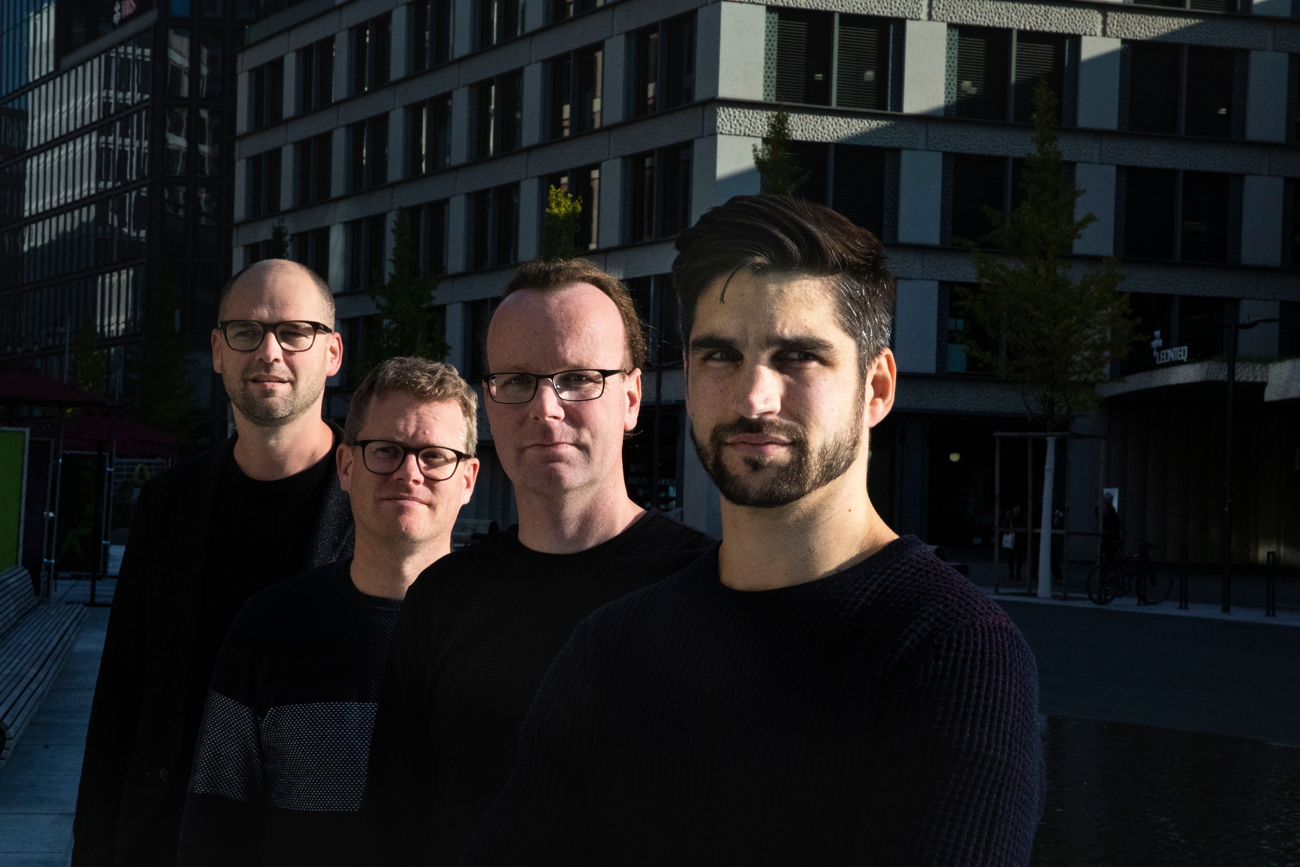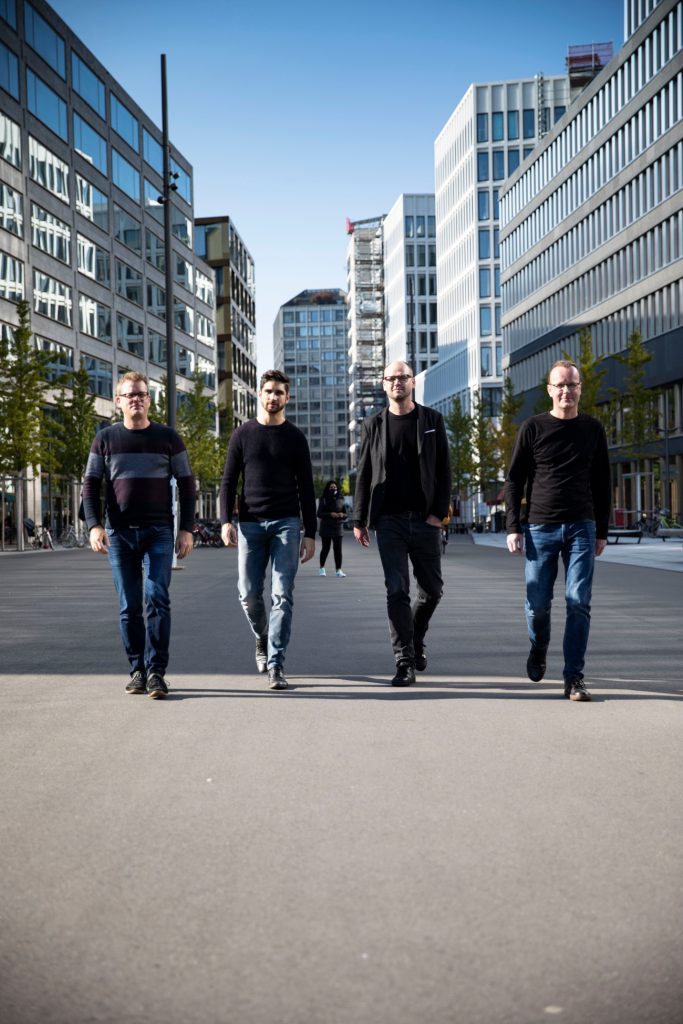The Bernese saxophone quartet celebrates its 20th anniversary with contemporary music celebration.
To produce every possible sound on the saxophone – that is the craft of the Konus Quartet. The four musicians specialise in contemporary and experimental music, showing – as an ensemble – all the kinds of different sound worlds the saxophone is capable of. This year, the Konus Quartet celebrates its 20th anniversary with a festival week full of collaborations – for example with the Gori Women’s Choir from Georgia.
Florence Baeriswyl
Many saxophone quartets want to sound as virtuosic and full as possible, almost like an organ, but not the Konus Quartet: they play precisely and minimalistically, exploring the boundaries of saxophone music. Christian Kobi, Fabio Oehrli, Jonas Tschanz and Stefan Rolli: these are the musicians forming the Quartet, which celebrates its 20th anniversary this year. The four artists are all versatile, with backgrounds ranging from free improvisation, sound mixing and label management to big band and festival management. What they share is a passion for the saxophone and the love for musical experimentation.

Minimalism and precision
Christian Kobi, for example, has already created music with the saxophone’s silence. To achieve this, he mounted microphones very close to the blowpipe and recorded the instrument’s resonance without blowing into it. He amplified the silence recorded with this procedure until feedback occurred. The result is a sustained, inconspicuous sound that is easy to overhear if you don’t pay attention.
In rawlines 1, Christian Kobi lets silence become sound through feedback of resonances inside the saxophone.
Modular and forward-looking
While traditional saxophone quartets usually consist of the four main instruments of the saxophone family – baritone, tenor, alto and soprano – the Konus Quartet is modular and remains flexible in its instrumentation. Depending on the piece, they play in the traditional line-up, but sometimes also with two alto saxophones, one tenor and one baritone, or even with two tenor and two baritones.
This flexibility is also something the quartet seeks, when compositions are commissioned, working primarily with composers who have explored sound in depth and are not limited by traditional expectations of saxophone quartets. Among the pieces they perform are compositions by important names on the international contemporary music scene such as Chiyoko Szlavnics, Jürg Frey, Barry Guy, Makiko Nishikaze, Phill Niblock, Urs Peter Schneider, Martin Brandlmayr or Klaus Lang.
FORWARD & REWIND: A celebration of contemporary music
To celebrate its 20th anniversary, Konus Quartet is holding a festival weekend in Bern entitled Foward & Rewind. The two words Forward & Rewind are meant literally, as the four saxophonists revisit past collaborations and strive for new ones, showing themselves to be both thoughtful and forward-looking.
One of the already existing collaborations is, for example, with the string quartet Quatuor Bozzini. In 2021, the Konus Quartet premiered the piece Continuité, fragilité, resonance by Swiss composer Jürg Frey with them. For the festival’s opening concert, Konus Quartet and Quatuor Bozzini will revisit this piece, together with another work by composer Chiyoko Szlavnics. The musicians give themselves plenty of time and space – and patiently and precisely unfold the various sound surfaces that are hidden in the compositions.
During a Lifetime (excerpt): The Konus Quartet interprets a piece by Canadian composer Chiyoko Szlavnics.
Powerful voices from Georgia
A new collaboration is scheduled with the renowned Georgian Gori Women’s Choir, which has been presenting traditional Georgian choral singing since 1970. This polyphonic singing technique is hundreds of years old and distantly related to the yodelling we know. It is characterised in particular by the almost physically perceptible power in the voice. The women sing partly in unison, partly in microtonal ranges, mixing harmony and dissonance.
Since 2013, the choir has been led by Teona Tsiramuna and has reinvented itself, so to speak. It is very important to the director to always discover new things and to combine the vocal tradition with modern and international music. “In 1970, the choir sang for a specific, fairly homogeneous audience. It performed mainly melancholic and sustained Georgian music. Now that has expanded. We also sing Mexican, Turkish or African folk music,” says Tsiramuna in an interview for SRF 2 Kultur.
After a collaboration with Georgian-British pop and blues singer Katie Melua, the Gori Women’s Choir gained fame beyond the borders of Georgia and now performs on European stages in various constellations. The conductor’s love of experimentation also draws her to collaborations with contemporary musicians, for example at the Stanser Musiktage.
At the Stanser Musiktage 2022, they performed with four young electronic artists, merging voices with synthesiser sounds.
“Air Vibrations”
Air vibrations, the collaboration between the Konus Quartet and the Gori Women’s Choir, can relate on one hand to the vibration of the “air “, on the other hand in can be interpreted as “song vibrations”, from the Italian “aria”. The Gori Women’s Choir brings its voices to vibrate together with two other big names of contemporary music: Georgian-Swiss pianist Tamriko Kordzaia and Austrian composer and concert organist Klaus Lang.
Die neue Kollaboration knüpft an die erste Zusammenarbeit zwischen Klaus Lang und dem Konus Quartett, dem Stück Drei Allmenden, an.
Lang conceived and composed the concert and is featured on the organ. His works are characterised by the way he explores sound. Music is “time made audible”, says Lang. On his instrument, the concert organ, this side of sound can be explored particularly well, as one can hold the notes for any length of time.
In the Air Vibrations concert, Lang interweaves his organ playing with the Konus Quartet’s saxophones and Tamriko Kordzaia’s piano playing, laying the ground for the traditional singing of the Gori Women’s Choir. This creates music that mixes the old and the new and is thus fully in the spirit of the festival: Forward & Rewind.
Florence Baeriswyl

FORWARD & REWIND Bern
3.5.23, 18:30: concert «Continuité, fragilité, resonance» Jürg Frey, with Quator Bozzini, les Concerts de musique Contemporaine (CMC) La Chaux-de-Fonds
5.5.-7.5.23: Fest für neue Musik , Bern
5.5. 19:30: Interlaced Resonances, Aula PROGR Bern
6.5. 19:30: Voltage Cracklings, Aula PROGR Bern
7.5. 19:30: Air Vibrations, Kirche St Peter & Paul Bern
concert: Moods Zürich
8.5.23, 20:30: «Air Vibrations»
Fabio Oehrli, Jonas Tschanz, Chiyoko Szlavnics, Barry Guy, Makiko Nishikaze, Phill Niblock, Martin Brandlmayr, Klaus Lang, Quatuor Bozzini
broadcasts SRF 2 Kultur:
Neue Musik im Konzert, 19.7.2023: Konzert Konus Quartett und Gori Women’s Choir, Bern: Air vibrations
Neue Musik im Konzert, 12.1.22: Jürg Frey: Stehende Schwärme
Musik unserer Zeit, 13.11.13: «zoom in» – der Saxophonist und Veranstalter Christian Kobi
Online-Artikel, 13.11.13: Das Rauschen des Nichts: Der Saxophonist Christian Kobi
Musik unserer Zeit, 17.07.2019: Saxophonzauber mit dem Konus Quartett
Musikmagazin, 21.5.22: Chorleiterin Teona Tsiramua: «Wir singen nicht nur Wiegenlieder»
neo-profiles:
Konus Quartett, Tamriko Kordzaia, Christian Kobi, Jürg Frey, Urs Peter Schneider, Jonas Tschanz

